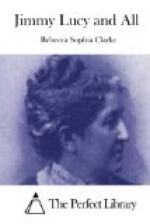And then the old lady turned to her knitting again; indeed her fingers had been flying all the while she talked. Mr. Templeton looked at her curiously, and wondered if she disliked children.
“I’d as lief have ’em ’round the house as her birds and kittens anyway,” he reflected; for she kept a magpie, three cats and a canary; and these pets had not been always agreeable guests at the hotel.
It was now nearly six o’clock, and savory odors from the kitchen mingled with the balmy breath of the flowers stealing in from the lawn. The Dunlee party had barely time for hasty toilets when the gong sounded for dinner. The Templeton dining-room was large and held several tables. The Dunlees had the longest of these, the one near the west window. There were twelve plates set, though only nine were needed to-night. The three extra plates had been placed there for the Hale family, who were expected to-morrow. Mrs. Dunlee had told the landlord that she would like the Hales at her table.
“And Bab will sit side o’ me,” said Lucy. “Oh, won’t we be happy?”
As the Dunlees took their seats to-night and looked around the room they saw a droll sight. The old lady, who had been knitting on the veranda, was seated at a small table in one corner; and on each side of her in a chair sat a cat! One cat was a gray “coon,” the other an Angora; and both of them sat up as grave as judges, nibbling bits of cheese. Mrs. McQuilken herself, dressed in a very odd style, was knitting again. She was a remarkably industrious woman, and as it would be perhaps three or four minutes before the soup came in, she could not bear to waste the time in idleness. Her head-dress was odd enough. It was just a strip of white muslin wound around the head like an East Indian puggaree. Mrs. McQuilken had many outlandish fashions. She was the widow of a sea-captain and had been abroad most of her life. The children could hardly help staring at her. Even after they had learned to know her pretty well they still wanted to stare; and not being able to remember her name they spoke of her as “the knitting-woman.”
“Look, Lucy,” whispered Jimmy; “there’s a boy I know over there at that little table. It’s Nate Pollard.”
He waved his hand toward him and Nate waved in reply. At home Jimmy had not known Nate very well, for he was older than himself and in higher classes; but here among strangers Jimmy-boy was glad to see a familiar face. Mr. and Mrs. Pollard were with their son. Perhaps they had all come for the summer. Jimmy hoped so.
There were two colored servants gliding about the room, and a pretty waiting-maid.
“O dear, no cook from Cathay,” whispered Kyzie to Edith.
“I don’t know what you mean.”
“I mean I wanted a cook from Cathay or Cipango,” went on Kyzie, laughing behind her napkin.
“I’m going to shake you,” said Edith, who suddenly bethought herself that Cathay and Cipango were the old names for China and Japan. This had been part of her history lesson a few days ago. How Kyzie did remember everything!




